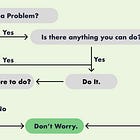Rejection Therapy
The science behind our deepest fear—and how to rewire your brain to handle it.
I hate rejection.
Rejection is my greatest fear.
Whether I’m being rejected for who I am, managers and admissions officers rejecting me because I’m not good enough, or potential partners rejecting my offers, I despise it.
So… why does rejection hurt so much?
Humans evolved to be afraid of rejection.
Back then, being rejected by your tribe meant death. Death means your genetics aren’t being passed along.
It’s a primal fear.
FMRI studies show that social rejection activates the same brain regions (anterior cingulate cortex & insula) as physical pain.
Rejection targets your self-worth and ego. It creates a fear of being “unworthy”.
To make it worse, our brains amplify negative experiences (negativity bias).
When people are rejected, this is what they do:
withdraw: they avoid future risks
aggression: they may lash out
ruminate: they may obsessively replay and think about the rejection
self-sabotage: preemptively rejecting others/undermining opportunities to avoid being hurt
We learn and feel that rejection is bad.
Potential sources of people feeling rejection more than others are:
Childhood experiences with early bullying/parental neglect
Anxious attachment (fear of abandonment)
perfectionism where self worth = external validation
The 100-Day Rejection Therapy Challenge
Rejection therapy is a self-improvement exercise where people intentionally seek rejection to get rid of their fear of it.
Created by Jason Comely in 2009, it was popularised by Jia Jiang’s 100 Days of Rejection challenge.
Here’s how it works:
actively seek situations where you may be rejected— for me, they might be:
pitching ideas
sending cold emails to internships
asking for a discount
goal is to reduce anxiety around rejection
teaches that rejection is not personal, and stepping out of your comfort zone can lead to unexpected opportunities
You can actually play the game here: 100 Days of Rejection — Rejection Therapy
I’m actually going to play along with the theme here— I’m going to ask Jia Jiang (the TED speaker) if I can interview him.
This is my email:
Hi Jia,
Hope you're well!
I'm Jonathan, a 16-year-old entrepreneur who's exploring different topics in bio, philosophy and youth empowerment.
I recently started a newsletter where I write about these topics. I just published one on Rejection Therapy, and I had the idea to make interviewing you one of my challenges. Your work and the lives you've changed truly inspire me :)
So, I'm asking you if you'd be willing to do a free interview with me, where we'll discuss rejection therapy and your journey with it.
Would love to find 20-40 minutes sometime if you're open to it! :)
Best,
Jonathan Ye
ps. this is the link to my newsletter! https://jonathanye.substack.com/
Wish me luck! If he agrees, you’ll see my first podcast post on Substack :)
Other Helpful Techniques to Deal With Rejection
Here are some other techniques that are great for dealing with rejection:
Focus on What You Control
Rejection → Redirection
instead of thinking “they don’t want me,” think of it as “we aren’t the right fit” or “I’m now close to a yes”
Steve Jobs was fired from Apple, built Pixar and returned to revolutionize the company— rejection was just redirection for him
Question the Worst Case Scenario
What happens if they reject you? Normally it’s not catastrophic
You have the freedom to walk away
In the end, rejection hurts.
But, it doesn’t have to hold you back.
By reframing rejection as redirection, focusing on what you control, and actively going through rejections, you train your mind to see "no" as feedback.
The most successful people aren’t those who avoid rejection—they’re the ones who learn from it.
Comment below or reply to this email! What is one rejection you’re afraid of?




Are you afraid of rejection? Well this article may be change your mind
Great insights!